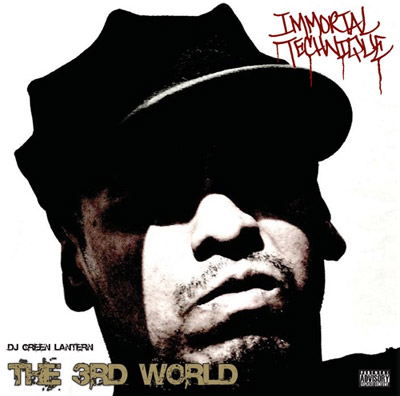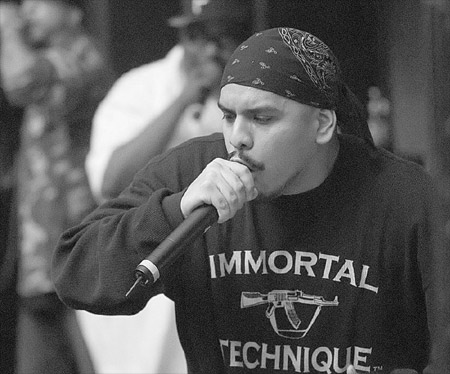
| HOME |
| NERVE |
| REVIEWS |
| ARCHIVE |
| EVENTS |
| LINKS |
| ABOUT US |
| CONTRIBUTORS |
| BACK ISSUES |
| CONTACT US |
Interview with Immortal Technique
By Paul Tarpey - 4/9/2014
The levels to which the mainstream has attempted to co-opt the voice of hip hop culture is testimony to its ability to empower.The pride and passion of many early artists was soon extricated from the message and fed back to the public as arrogance and greed. The foundations have proved strong though and those artists who strived to keep debate at the centre of the culture are finding a means to stay independent and to reach an audience hungry for honesty. One of the most determined and skillful voices belongs to Felipe Andres Coronel, aka Immortal Technique.
 His
family emigrated in 1980 to Harlem from Peru. The area threw up challenges
at an early age but also provided access to a community that would support
voices spoken with dignity. Emerging from the unforgiving arena of rap
battles, he developed a unique style that had been refined by education
during a brief imprisonment and from studying political science on his
release.
His
family emigrated in 1980 to Harlem from Peru. The area threw up challenges
at an early age but also provided access to a community that would support
voices spoken with dignity. Emerging from the unforgiving arena of rap
battles, he developed a unique style that had been refined by education
during a brief imprisonment and from studying political science on his
release.
Independent releases Revolutionary Vol. 1 and 2 brought him to the attention of a wider audience and his reputation has grown over a decade to the point where he has become a leading spokesperson beyond the music industry.
Away from his career he has raised tens of thousands of dollars for children’s hospitals overseas and has created a writing grant program for high school students.
With the profits of his 3rd World album, released in 2008 Immortal he visited Kabul in Afghanistan to help build an orphanage without any corporate or external funding. The orphanage, having been successfully established, currently houses over 20 orphaned children from Kabul.
This was an interview with Immortal Technique given after he returned from a massively successful tour of UK and Ireland this summer.
Can you describe how you feel hip hop culture's links to radical politics have changed and developed over the years?
Hip Hop was born partially out of a response to repressive protocols and policies that were implemented in the inner-city. Although the rise of corporatism did give investment and capital for the genre, it also co-opted the message itself and turned it from educational art form - from an organizational art form, into purely being about money. This isn't 100% the fault of the corporate system, they knew people have a propensity for greed, for quick money, so they needed a partner in a few individuals who were willing to just do that type of music. Then they sat back and watched the profit margin soar. And that became more important than the culture for them.
What are the key points in your life that you believe shaped your voice?
Seeing the world outside The United States of America. Having a father and a mother. They trained me and prepared me to be who I am. Growing up with my sister gave me an understanding of sexism, and what ladies go through dealing with everyday life in a patriarchal society. After all, a quick example brother, I met you at that spot. A quick understanding of the privilege we both have that we aren't necessarily conscious of. What do WE do to protect ourselves from being raped going home at 4AM? I don't even think about that, let alone how I would be defamed even if I was the victim of such an atrocity. I think that the voices of leaders from the past accounts just as much as of regular people's lives, and also shape my views. I have studied history and not just my own, but I wanted to dig into the roots of humanity. Prison, obviously affected the writing I do, and the outlook I have on how we treat people with addiction and mental disorders. and of course my overseas experience in Haiti, Afghanistan etc.
How did the early rap battles influence your style and how has your style changed?
I think that it made me capable of handling on stage situations, technical difficulties and the competitive spirit began to grow and evolve in terms of my stage presence. Those would be very small things, but being on small stages prepares you to be on big stages; it reminds you to practice public speaking and to relate to audiences, both small and large. Improvisation and techniques such as these has saved many a show. Haha!
You must have been aware that your political standpoint would bring criticism with it but has their been any criticism that has surprised you or disappointed you?
When people believe internet rumors, instead of actually talking or asking me things first - that disappoints me. However, that's rare because I have the humility to not really go around "expecting" things from people or anyone really, so I don't often feel that disappointment. I was called a battle rapper for years. Then people wanted to call me a conspiracy theorist. Mind you, I didn't make songs about aliens or reptilians or any Anti-Semetic or Anti-any faith nonsense. My "conspiracies"? That the war in Iraq was entered into under false premise and that corporations would reap benefits at the costs of millions of American lives.
 To
what extent do you see education within the American prison system as
a political battleground?
To
what extent do you see education within the American prison system as
a political battleground?
I believe that those resources are severely underfunded, so in that sense there is a battle for resources that are divided up by a system that wants to be paid more than it wants to sincerely help people. Which is always sad for the people on the ground in those positions who actually joined to help, but end up being locked behind the glass door of protocols and biased policies of sentencing that reflect more the attitudes of racism and classism than they really do democratic principles.
How did your collaboration with Mumia Abu Jamal develop and how do you feel you have influenced each other?
I had always read about his case since I was very young, and unfortunately, there was so much railroading about the case and so much disinformation being spread. I realized how one individual who could have his entire life changed by the police seeking to cover up whatever happened on that night. Also, I take everything with a grain of salt, so I'm never a person that automatically just believes something because I read it on a pamphlet. I know that the bombings of the Move house which killed women and children was wrong. I had to research all of the inconsistencies of the case before I even decided to lend my voice to that cause. I even visited Mumia while he was incarcerated. He knows so much about the world, irrespective of being incarcerated for over 30 years.
Can you explain the difficulties in staying independent as an artist and how do you see this changing in the years to come?
Really when you are an artist, regardless of your skill level that has a machine behind him, there are so many advantages. Of course not just things you get for free, but things that you get a discount on, co-op marketing, the way people receive your materials comes with a large multi-national company with 34% of the market share vs. whatever small company you have. Once you are established as a label though, with a proven selling record, you may be able to better your circumstances such as I did with a powerful distributor where they collect only a small % for putting the record everywhere and you as the artist collect the lion's share of the profits, plus you have full creative control.
How do you feel a lack of independence effects artists?
I think that without a voice of your own, and only following someone else's vision, doesn't produce happiness. I don't really see how our art could be denigrated anymore in terms of ownership. However, with a sense of independence and the freedom of expression, (obviously not just for gratuitous purposes) even if you aren't successful, at least you are being true to yourself. Unless you see this form of entertainment as a complete stage show, in which one has to accept the moral responsibility for the games you play, because they are the perception of real people's lives.
*** To read the review by Paul Tarpey of Immortal Technique's gig at the East Village Arts Club in Liverpool click here